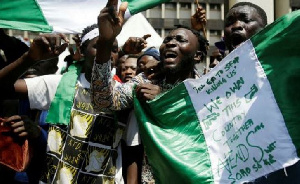Naira pops to N770.71 as demand pressures reduce

A major challenge for naira performance is the fact that foreign investors have maintenance distance from Nigeria as FX backlog estimated at about $10 billion owed to foreign interest has not been released for repatriation.
Though FX analysts’ estimate showed the local currency is undervalued, the monetary authority lost a chance to achieve exchange rate convergence after the June devaluation due to a weak external buffer.
At the open market, exchange rate pressures continue as currency speculators made brisk FX spreads on the back of sustained US dollar shortage in the economy. Nigeria is still faced with FX inflow scarcity due to foreign investors’ apathy to the local markets.
The market has been washed with large FX logs in recent weeks, causing negative exchange rate movements across the markets. It is not clear if the Central Bank of Nigeria has paid off the backlog forex demand by local businesses.
Surprisingly for the first time in the week, the Naira saw a breather on Wednesday, appreciating against the US dollar by 0.76% to N770.71 at the Investors and Exporters (I&E) windows as demand pressure cooled.
The exchange rate at the window had depreciated while the apex bank market clearing rate appears to have been lost until the next devaluation. Investment banking analysts told MarketForces Africa that it is not clear if the apex bank raised the supply side as the demand level at the Investors and Exporters window has been growing above the US dollar supply in the past few days.
MarketForces Africa reported that the CBN had pledged to clear the FX backlog worth $2.5 billion in two weeks. Thereafter, the balance in external reserves started nosediving in a successive manner.
However, at the parallel market, there was further demand pressure as the local currency depreciated by 1.55% to a new low of N980. The oil market still remains strong, though prices reacted to the strong dollar amidst the US Fed decision.
Accretion into external reserves has been unimpressive as a recently privatised state oil company has swapped Nigeria’s oil for loans. Irrespective of the movement in global oil prices, gross external reserves continue to hover around $33 billion to $34 billion in the last few months.
MarketForces Africa reported that ICE Brent crude pared loss by 0.72% to $93.66 per barrel, while WTI crude declined by 0.86% to $89.70 per barrel. This comes after the EIA report showed that US crude inventories fell by 2.135 million barrels last week, broadly in line with market expectations of a 2.2 million draw.
Meanwhile, Oil prices eased on Wednesday ahead of the U.S. Federal Reserve’s interest rate decision, with investors uncertain when rates will peak and how that will affect energy demand.
Source: dmarketforces.com





